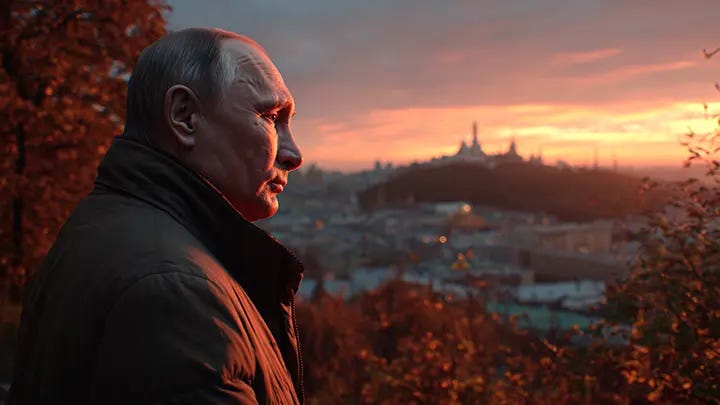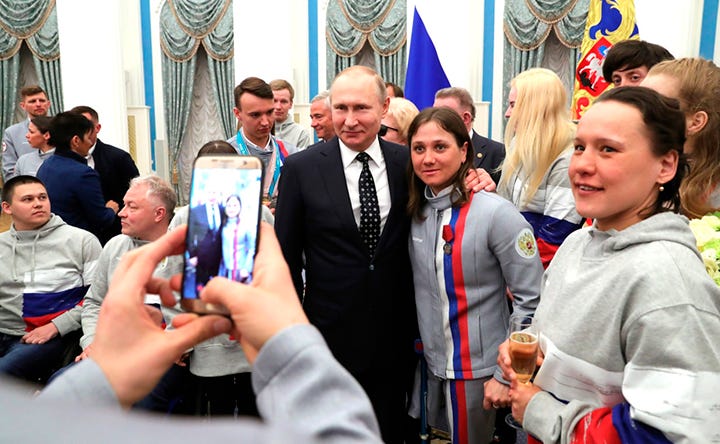Putin as Princeps and Pontifex
Putin’s Bridge from Republic to Empire
Alexander Dugin reflects on Vladimir Putin’s role in Russian history, tracing his place between republic and empire.
Putin’s birthday is a national holiday because Putin himself represents, within our political system, the Princeps. This is a Roman concept — Princeps, Principate. It denotes the central figure of a political order, something intermediate between a republic and an empire. In this respect, Putin is a pioneer. He is transforming the collapsing, corrupt, pro-Western, sovereignty-stripped, disintegrating republic of the 1990s into the future Empire. He himself stands as a kind of bridge towards it.
In ancient times, an emperor (even during the Roman Republic) was called Pontifex Maximus — bridge builder. Later, this title passed on to the Pope of Rome, but originally it symbolized sacred power. Putin is precisely such a bridge builder. He creates the passage from a failed, collapsing republic to a rising, ascending Empire.
This is his fundamental role. It lies not only in his position and function, for very different persons, different individuals, when granted supreme authority, can use it in very different ways — some for tyranny and self-assertion, others for excessive piety and devotion, neglecting the stern dimension of sovereign rule.
Thus, the possibilities of the Supreme Ruler are enormous, but much depends on whether the individual who possesses supreme power corresponds to the very nature of that power. In Putin — as a person — this correspondence has proven extraordinarily successful, perhaps even salvific, fateful for our country in the time in which we live.
There exists a doctrine from the late Middle Ages, extending to the Reformation, studied by Ernst Kantorowicz, a remarkable historian and political philosopher. He described the phenomenon of the “two bodies of the king.” One body is the king’s individual body, the other is his function as Princeps, the body of the ruler. That is, one body is the individual’s, the other is the body of the sacred function — standing at the head of society, at the head of the political order.
In Putin we see harmony between these two bodies: between the individuality of Vladimir Vladimirovich Putin, with his personal path and personal story, and the body of the Supreme Ruler of Russia at a critical, decisive moment. Depending on how these two bodies interact, history turns towards salvation and success or towards failure.
In Putin we see the harmony of these two dimensions: the sacred dimension of the Principate, and the personal destiny of a security officer, a patriot, a servant of his Motherland in every role, however modest.
Putin is a man of the people. He reached his position from the lower rungs, serving the Motherland faithfully and truthfully at every stage. He is a meritocratic Princeps, having risen to supreme power through his merits (meritas), not through an inherited position or privileges. This too must be remembered.
In this respect, especially looking back on twenty-five years of his rule, Putin has achieved — sometimes invisibly — an extraordinary reversal of Russian history. Our country was rushing into the abyss. It fell into the abyss in 1991 and was about to plunge from the last ledge, to lose sovereignty completely, and to submit to external administration — the course to which Yeltsin’s policies were in fact leading.
It was Putin who grasped our country, dangling by the last thread from the cliff, before it smashed into the bottom of the chasm and shattered to pieces (and this was a reality within arm’s reach). With incredible effort, yet with great care, he pulled it back — at least returning it to solid ground. Then we began to think of how to restore our place in history, how to regain full sovereignty, and how to revive Greater Russia, which in the 1990s seemed lost forever.
In this sense, Putin is a man of destiny, a man marked by the force of Russian history — difficult, paradoxical, whose signs and hieroglyphs we do not always decipher. We do not always understand what history asks of us, for it does not always speak clearly.
Great deeds are not always preceded by great manifestos. Sometimes history utters inarticulate sounds, and then comes flowering and ascent. Russian history is full of paradoxes, and within this history Putin and his rule, undoubtedly, even now (from the very beginning it was evident) proceed under the sign of light.
In Roman history, there was a tradition of a succession of emperors: one bad, the next good, then bad again, then good. They formed a pattern, almost binary: 1-0, a successful emperor, a failed emperor. In our history it is not always so, yet there are rulers who, from the perspective of historical accomplishment in the fabric, in the text of our history, are written in capital letters, in bold and underlined. They embody something important, positive, and salvific.
Some rulers were cruel, some humane. Putin himself is undoubtedly humane, not cruel, yet in stature he stands alongside the greatest figures of Russian history. The fact that he has managed to carry out his extraordinarily difficult achievements in saving Russia’s domestic order bloodlessly, that he never usurps additional powers, never exceeds them, and instead conducts himself with great humanity, tolerance, even towards ideological opponents — this makes him unique.
I believe Putin is building a bridge toward the true spiritual, social, and economic rebirth of Russia. I sincerely congratulate our Supreme Ruler, our Princeps, the one lifting Russia from its knees, on his Name Day!1 To the Angel — a golden crown!
(Translated from the original Russian version on Tsargrad TV.)
Translator’s Note: In Russian tradition, “Name Day” (День ангела, literally “Angel’s Day”) refers to the feast day of the saint after whom a person is named. It is believed that on this day one’s guardian angel offers special protection. The occasion is celebrated in a manner similar to a birthday, but with distinct religious significance.






Wonderfully observed, written. Vladimir Putin is a great and powerful soul, sent not just to pull Russia from the abyss, but to stop the dark forces running the world into the ground and to guide us all to a better future. Long may he prosper.
The longevity of his reign is extraordinary. Putin has endured because of his Faith which has given him an eternal perspective & temperament to endure. Also the Wisdom to make the right moves.